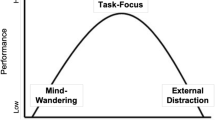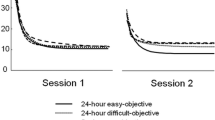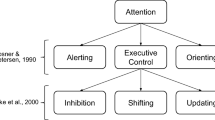Abstract
A key aspect of metacognition is the ability to monitor performance. A recent line of work has shown that error-monitoring ability captures both the magnitude and direction of timing errors, thereby pointing at the metric composition of error monitoring [e.g., Akdoğan and Balcı (J Exp Psychol https://dx.doi.org/10.1037/xge0000265, 2017)]. These studies, however, primarily used a composite variable that combined isolated measures of ordinal confidence ratings (as a proxy for error magnitude judgement) and “shorter/longer than the target” judgements. In two experiments we tested temporal error monitoring (TEM) performance with a more direct measure of directional error magnitude rating on a continuum. The second aim of this study is to test if TEM performance is modulated by the feeling of being watched that was previously shown to influence metacognitive-like monitoring processes. We predicted that being watched would improve TEM performance, particularly in participants with high timing precision (a proxy for high task mastery), and disrupt TEM performance in participants with low timing precision (a proxy for low task mastery). In both experiments, we found strong evidence for TEM ability. However, we did not find any reliable effect of the social stimulus on TEM performance. In short, our results demonstrate that metric error monitoring is a robust metacognitive phenomenon, which is not sensitive to social influence.


Similar content being viewed by others
References
Aiello, J. R., & Douthitt, E. A. (2001). Social facilitation from Triplett to electronic performance monitoring. Group Dynamics: Theory, Research, and Practice, 5(3), 163.
Akdoğan, B., & Balcı, F. (2017). Are you early or late?: Temporal error monitoring. Journal of Experimental Psychology: General, 146(3), 347–361.
Baltazar, M., Hazem, N., Vilarem, E., Beaucousin, V., Picq, J. L., & Conty, L. (2014). Eye contact elicits bodily self-awareness in human adults. Cognition, 133(1), 120–127. https://doi.org/10.1016/j.cognition.2014.06.009.
Brainard, D. H. (1997). The psychophysics toolbox. Spatial Vision, 10(4), 433–436.
Brocas, I., Carrillo, J. D., & Tarrasó, J. (2018). Self-awareness of biases in time perception. Journal of Economic Behavior & Organization, 148, 1–19.
Çavdaroğlu, B., Zeki, M., & Balcı, F. (2014). Time-based reward maximization. Philosophical Transactions of the Royal Society B Biological Sciences. https://doi.org/10.1098/rstb.2012.0461.
Chib, V. S., Adachi, R., & O’doherty, J. P. (2018). Neural substrates of social facilitation effects on incentive-based performance. Social Cognitive and Affective Neuroscience, 13(4), 391–403.
Conty, L., George, N., & Hietanen, J. K. (2016). Watching eyes effects: When others meet the self. Consciousness and Cognition, 45, 184–197.
Conty, L., Gimmig, D., Belletier, C., George, N., & Huguet, P. (2010a). The cost of being watched: Stroop interference increases under concomitant eye contact. Cognition, 115(1), 133–139.
Conty, L., Russo, M., Loehr, V., Hugueville, L., Barbu, S., Huguet, P., et al. (2010b). The mere perception of eye contact increases arousal during a word-spelling task. Social Neuroscience, 5(2), 171–186.
Corston, R., & Colman, A. M. (1996). Gender and social facilitation effects on computer competence and attitudes toward computers. Journal of Educational Computing Research, 14(2), 171–183.
Cottrell, N. B. (1972). Social facilitation. In C. G. McClintock (Ed.), Experimental social psychology. New York: Holt.
Doenyas, C., Mutluer, T., Genç, E., & Balcı, F. (2019). Error monitoring in decision-making and timing is disrupted in autism spectrum disorder. Autism Research, 12(2), 239–248.
Double, K. S., & Birney, D. P. (2019). Do confidence ratings prime confidence? Psychonomic Bulletin & Review, 2003, 1–8. https://doi.org/10.3758/s13423-018-1553-3.
Duyan, Y. A., & Balcı, F. (2018). Numerical error monitoring. Psychonomic Bulletin & Review, 25(4), 1549–1555.
Duyan, Y. A., & Balcı, F. (2019). Metric error monitoring in the numerical estimates. Consciousness and Cognition, 67, 69–76.
Duyan, Y. A., & Balcı, F. (2020). Monitoring line length reproduction errors. Consciousness and Cognition, 77, 102831.
Eskenazi, T., Montalan, B., Jacquot, A., Proust, J., Grèzes, J., & Conty, L. (2016). Social influence on metacognitive evaluations: The power of nonverbal cues. Quarterly Journal of Experimental Psychology, 69(11), 2233–2247. https://doi.org/10.1080/17470218.2015.1115111.
Flavell, J. (1979). Metacognition and cognitive monitoring: a new area of cognitive-developmental inquiry. American Psychologist, 34(10), 906–911. https://doi.org/10.1037/0003-066X.34.10.906.
Flavell, J. H., & Wellman, H. M. (1977). Metamemory. In R. V. Kail Jr. & J. W. Hagen (Eds.), Perspectives on the development of memory and cognition. Hillsdale, NJ: Lawrence Erlbaum.
Fleming, S. M., & Daw, N. D. (2017). Self-evaluation of decision-making: A general Bayesian framework for metacognitive computation. Psychological Review, 124(1), 91–114.
Fleming, S. M., & Dolan, R. J. (2012). The neural basis of metacognitive ability. Philosophical Transactions of the Royal Society B: Biological Sciences, 367(1594), 1338–1349.
Fleming, S. M., Dolan, R. J., & Frith, C. D. (2012a). Metacognition: computation, biology and function. Philosophical Transactions of the Royal Society B: Biological Sciences, 367(1594), 1280–1286. https://doi.org/10.1098/rstb.2012.0021.
Fleming, S. M., Huijgen, J., & Dolan, R. J. (2012b). Prefrontal contributions to metacognition in perceptual decision making. Journal of Neuroscience, 32(18), 6117–6125.
Gallucci, M. (2019). GAMLj: General analyses for linear models. [jamovi module]. Retrieved from https://gamlj.github.io/.
Gibbon, J., Church, R. M., & Meck, W. H. (1984). Scalar timing in memory. Annals of the New York Academy of Sciences, 423, 52–77.
Gibbon, J. (1977). Scalar expectancy theory and Weber’s law in animal timing. Psychological Review, 84(3), 279–325. https://doi.org/10.1037/0033-295X.84.3.279.
Grant, T., & Dajee, K. (2003). Types of task, types of audience, types of actor: Interactions between mere presence and personality type in a simple mathematical task. Personality and Individual Differences, 35(3), 633–639. https://doi.org/10.1016/S0191-8869(02)00241-6.
Hazem, N., George, N., Baltazar, M., & Conty, L. (2017). I know you can see me: Social attention influences bodily self-awareness. Biological Psychology, 124, 21–29. https://doi.org/10.1016/j.biopsycho.2017.01.007.
Jacquot, A., Eskenazi, T., Sales-Wuillemin, E., Montalan, B., Proust, J., Grèzes, J., et al. (2015). Source unreliability decreases but does not cancel the impact of social information on metacognitive evaluations. Frontiers in Psychology, 6, 1–11. https://doi.org/10.3389/fpsyg.2015.01385.
Kononowicz, T., Roger, C., & van Wassenhove, V. (2019). Temporal metacognition as the decoding of self-generated brain dynamics. Cerebral Cortex, 29(10), 4366–4380.
Kononowicz, T. W., & van Wassenhove, V. (2019). Evaluation of Self-generated Behavior: Untangling Metacognitive Readout and Error Detection. Journal of Cognitive Neuroscience, 31(11), 1641–1657.
Lake, J. I., LaBar, K. S., & Meck, W. H. (2016). Emotional modulation of interval timing and time perception. Neuroscience & Biobehavioral Reviews, 64, 403–420.
Orr, J. M., & Carrasco, M. (2011). The role of the error positivity in the conscious perception of errors. Journal of Neuroscience, 31(16), 5891–5892.
Overgaard, M., & Sandberg, K. (2012). Kinds of access: Different methods for report reveal different kinds of metacognitive access. The Cognitive Neuroscience of Metacognition, 9783642451, 67–85. https://doi.org/10.1007/978-3-642-45190-4_4.
Rattat, A. C., & Droit-Volet, S. (2012). What is the best and easiest method of preventing counting in different temporal tasks? Behavior Research Methods, 44(1), 67–80.
Riemer, M., Kubik, V., & Wolbers, T. (2019). The effect of feedback on temporal error monitoring and timing behavior. Behavioural Brain Research, 369, 111929.
RStudio Team (2015). RStudio: Integrated Development for R. RStudio, Inc., Boston, MA URL https://www.rstudio.com/
R Core Team (2018). R: A Language and environment for statistical computing. [Computer software]. Retrieved from https://cran.r-project.org/.
The jamovi project (2019). jamovi. (Version 0.9) [Computer Software]. Retrieved from https://www.jamovi.org
Triplett, N. (1898). The dynamogenic factors in pacemaking and competition. The American Journal of Psychology, 9(4), 507–533.
Uziel, L. (2007). Individual differences in the social facilitation effect: A review and meta-analysis. Journal of Research in Personality, 41(3), 579–601.
Yeung, N., & Summerfield, C. (2012). Metacognition in human decision-making: confidence and error monitoring. Philosophical Transactions of the Royal Society B: Biological Sciences, 367(1594), 1310–1321. https://doi.org/10.1098/rstb.2011.0416.
Zajonc, R. B. (1965). Social facilitation. Science. https://doi.org/10.1126/science.149.3681.269.
Acknowledgements
We thank Alper Mert (undergraduate research assistant at TMDM Lab) for his help with the data collection in Experiment 2.
Author information
Authors and Affiliations
Corresponding author
Ethics declarations
Conflict of interest
The authors declare no conflict of interest.
Ethical standards
This study has no animal subjects performing any part of the experimental procedures. All procedures that were held in this study were in accordance with the ethical standards of the institutional and/or national research committee and with 1964 Helsinki Declaration. Informed consent form was obtained from all participants prior to the beginning of the experimental procedures.
Additional information
Publisher's Note
Springer Nature remains neutral with regard to jurisdictional claims in published maps and institutional affiliations.
Electronic supplementary material
Below is the link to the electronic supplementary material.
Rights and permissions
About this article
Cite this article
Öztel, T., Eskenazi, T. & Balcı, F. Temporal error monitoring with directional error magnitude judgements: a robust phenomenon with no effect of being watched. Psychological Research 85, 2069–2078 (2021). https://doi.org/10.1007/s00426-020-01379-0
Received:
Accepted:
Published:
Issue Date:
DOI: https://doi.org/10.1007/s00426-020-01379-0




